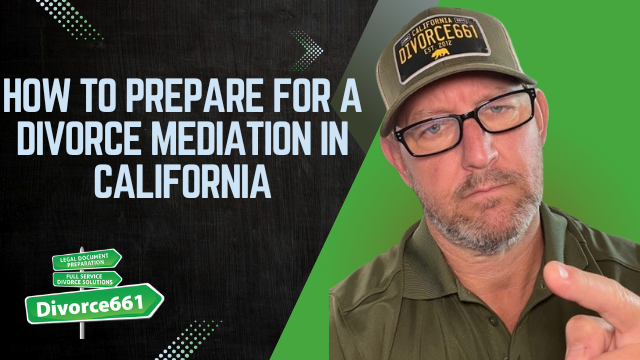How to Prepare for a Divorce Mediation in California
If you and your spouse want to keep the process amicable and avoid court, mediation is one of the best options available. Success in mediation does not come from luck. It comes from preparation. With the right documents, a clear set of goals, and a willingness to compromise, you can make mediation fast, productive, and far less stressful.
Why preparation matters
A well-prepared mediation session saves time, reduces conflict, and increases the chance you will reach a full agreement. When both sides arrive with accurate financial disclosures and realistic priorities, the mediator can focus on negotiation and solutions, not chasing missing paperwork. I have seen couples who were prepared reach a full agreement in just one session and finalize their divorce shortly after.
They had their paperwork in order, a general idea of what they wanted, and were open to compromise. As a result, they were able to reach a full agreement in just one session.
What to gather before mediation
Start by collecting and organizing all financial information. The more complete and accurate your records, the smoother the process will be. Key documents include:
- Income records: recent pay stubs, W-2s, 1099s, and tax returns for the last two to three years
- Bank and investment account statements: checking, savings, brokerage, and retirement accounts
- Property documentation: mortgage statements, deeds, recent appraisals or market value estimates
- Debts and liabilities: credit card statements, personal loans, car loans, HELOCs
- Retirement accounts and pensions: account summaries and plan documents
- Insurance policies: life, health, homeowners, and auto
- Business records: profit and loss statements, tax returns, valuation reports if applicable
- Monthly expenses: housing costs, utilities, childcare, tuition, medical expenses, and other recurring costs
Why each document matters
Financial disclosures let both parties and the mediator see the full picture. Income records inform support calculations, property documents determine equitable division, and account statements show available assets and debts to divide. Missing or vague information can lead to delays or mistrust during mediation.
Organize and disclose: the key to smooth mediation
California mediation works best when disclosures are organized, honest, and complete. Create a concise packet or spreadsheet that summarizes assets, debts, income, and expenses. Label documents clearly and have copies for the mediator and the other party. Clear disclosures reduce surprises and make it easier to reach workable solutions.
Clarify your goals and priorities
Before mediation, take time to decide what matters most to you. Think about immediate needs and long term priorities. Common questions to answer:
- Is keeping the house a priority, or would you prefer cash or another asset?
- What are your custody and parenting goals, if children are involved?
- How important is monthly cash flow versus a clean split of assets?
- What are your minimum acceptable outcomes and your ideal outcomes?
Rank your priorities and consider fallback positions. Being clear about what you can give up and what you cannot will help you negotiate effectively. Keep an open mind. Prepared couples who are willing to compromise tend to settle faster and with better outcomes for both sides.
What to expect at mediation
The mediator is a neutral facilitator whose job is to help you reach agreement, not to take sides. Sessions typically involve:
- Opening statements and explanation of the process
- Review of financial disclosures and key issues
- Negotiation and discussion of options
- Drafting a memorandum of understanding if agreement is reached
If you reach an agreement, that agreement will be written up and can be converted into a court order or judgment. Many couples who reach a full resolution in mediation use document preparation services to file the necessary court paperwork quickly and correctly.
Practical tips for mediation day
- Be on time and bring several copies of your organized financial packet
- Stay calm and focused on the issues, not personal attacks
- Be honest. Full disclosure is essential
- Listen actively and consider creative solutions
- Avoid ultimatums. Flexibility gets you farther than threats
- Consider bringing a coach or attorney for support if you need advice during the process
How professional help can speed things up
Working with a service that helps you organize disclosures and clarify goals can make mediation much more efficient. Preparing court-ready paperwork after you reach an agreement removes another potential obstacle and helps finalize the divorce faster. Flat-fee document preparation is an option many couples choose once they have a mediated settlement, because it makes the final steps predictable and less stressful.
Checklist: Documents to bring to mediation
- Last two to three years of federal tax returns
- Recent pay stubs and/or proof of income
- Bank and investment account statements (last 3 months)
- Retirement account and pension statements
- Mortgage statements and property documents
- Credit card statements and loan balances
- Monthly expense summary
- Business financial statements, if applicable
- Insurance policy summaries
Final thoughts and next steps
Mediation is an excellent path to an amicable California divorce when both parties prepare, disclose fully, and come ready to negotiate. If you want help getting organized before your mediation, or if you need flat-fee document preparation after you reach agreement, professional support can make the entire process smoother and faster.
Visit Divorce661.com to schedule a free consultation and get help preparing for mediation. We will help you enter mediation with confidence and set you up for a successful outcome.

